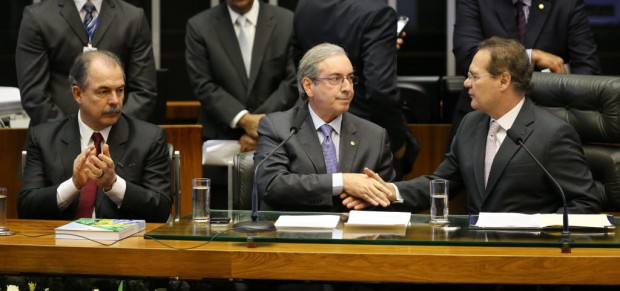For Brazilians that voted for President Dilma, hoping that her campaign messages of social progress and left-wing struggle would translate to reality, the rise of Eduardo Cunha (pictured above, center) is a nightmare.
The new President of Brazil’s lower legislative house is a dedicated homophobe as well as a classic Brasília dealmaker – with all the messiness that involves – facing numerous corruption charges.
Eduardo Cunha’s election was a huge shock to President Dilma, and a huge disappointment for anyone on the side of LGBTQ rights in Brazil. But even though he represents Evangelical Christians and is to the right of the ruling Workers’ Party, he is not the kind of figure that is celebrated by Brazilian conservatives, either.
It’s widely believed that he won his spot as President of Brazil’s Chamber of Deputies (Brazil, like the US, has two legislative houses, and the Chamber passes laws alongside the Senate) not because of widespread popular support, but by promising favors and deals to other politicians in the manner that his PMDB party is famous for. His critics say he is, first and foremost, a political businessman, buying and selling influence and favors.
But that didn’t stop him from getting right to work on the reactionary side of Brazil’s human rights and culture wars. He started off with a bang, demanding that Congress look into creating a “Heterosexual Rights Day.”
Brazil is a contradictory country when it comes to social issues and LGBTQ rights. The executive branch and Workers’ Party are center-left, while Congress, elected semi-indirectly in a complicated process, moved even further to the right in last year’s elections. In Rio, Cunha can be elected alongside representatives like Jean Wyllys (PSOL-RJ), an openly gay former reality TV star, who is now one of the most eloquent defenders of gay rights in Brazil.
The resulting laws are also conflicting. Where else in the world can you get a free sex change operation under the public health system, but abortion is illegal? Dilma said she would support an anti-homophobia law during the campaign. But despite Brazil’s progress toward marriage equality and LGBTQ rights and widespread dissatisfaction with corruption in the government, Cunha is able to hold one of the most powerful seats in Brasília, because he can convince the other members of Congress to give it to him.
Brazil’s Congressional leaders are not, and cannot, be selected in the way that they are in countries with a smaller number of established parties. Since there are 28 (!) parties now active in Brazil’s Congress, any leader can theoretically be elected in a secret ballot. And Cunha won.
Cunha is an outspoken homophobe and is against the legalization of abortion. He refers to homosexuals as “heterophobes.” His twitter account warns Evangelicals to defend themselves from “attacks” from gays, “abortistas” (pro-choice activists), and “maconheiros” (marijuana legalization activists, or more literally, “stoners“).
When a Brazilian novela aired the nation’s first ever televised gay kiss, Cunha took to Twitter:
“I must express my repulsion at the gay kiss on TV. Soon there are going to be gay sex scenes on TV.”
As the author of the most proposals for rigid abortion legislation, he represents a serious threat to women’s reproductive rights. In 2013, when Congress approved a proposal to regulate the care of rape victims in the Unified Health System (SUS) [Lei 12.845/13], Cunha wrote proposal PL 6033/13 that would overturn the law, citing that it “stimulated the practice of abortion in the country.”
And of course, Cunha is linked to several multi-million dollar corruption scandals. While he was president of the Rio State Housing Company in 1999, he was accused of fraud for irregular contracts and for favoring a friend’s construction company. He stepped down after only 6 months in the position. While being investigated, his lawyer was accused of falsifying documents in an attempt to cover up his crimes.
Cunha is currently being investigated in “the Petrolão,” arguably the largest corruption scandal in Brazilian history. A money delivery man in the scheme cited Cunha as one of the bribe recipients.
Liberals, activists and anti-corruption fighters all over Brazil are deeply worried. This was a blow they did not see coming. It’s hard to argue that the relatively moderate Aécio Neves could have ever posed the kind of threat to the progressive left that Cunha does. But Evangelicals have surged over the last 30 years, and Congress here is famously self-serving. They better wish Dilma good luck


